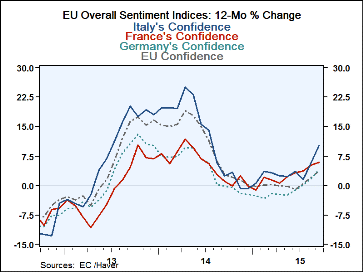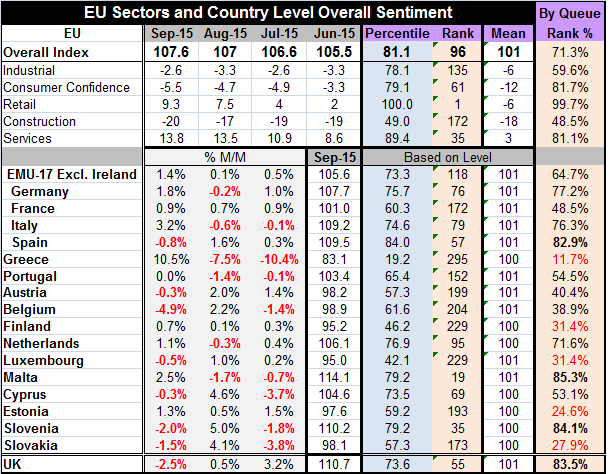 Global| Sep 29 2015
Global| Sep 29 2015EU Index Shows Surprising September Rise
Summary
The overall EU sentiment indices are moving higher year-over-year in the three largest EMU nations and for the EMU index itself. In September, the indices of the three largest EMU members also moved higher while the index for Spain, [...]
 The overall EU sentiment indices are moving higher year-over-year in the three largest EMU nations and for the EMU index itself. In September, the indices of the three largest EMU members also moved higher while the index for Spain, the fourth largest EMU economy, fell. There were increases in the indices of 10 of the 17 reporting EMU members in September.
The overall EU sentiment indices are moving higher year-over-year in the three largest EMU nations and for the EMU index itself. In September, the indices of the three largest EMU members also moved higher while the index for Spain, the fourth largest EMU economy, fell. There were increases in the indices of 10 of the 17 reporting EMU members in September.
The overall EU sentiment index rose to 107.6 in September from 107 in August. Among the five index components, three advanced in the month. The industrial sector improved to -2.6 in September from a reading of -3.3 in August. Retailing improved to 9.3 from 7.5. The services sector index expanded to 13.8 from 13.5. Falling on the month were construction that saw its index fall to -20 in September from -17 in August and consumer confidence which fell back to -5.5 in September, dropping from -4.7 in August.
Retailing is the leading sector in the EU. It stands in the 99.7 percentile of its historic queue of data (the top 0.3%) and is the highest value recorded by the sector since December 1987. Consumer confidence and the services sector are the next strongest readings with standings in the 81st percentile of their respective historic queues of data. Construction's standing is only in its 48th percentile and the industrial sector has the 59th percentile standing.
The consumer sector is driving the EU ahead and the manufacturing sector is lagging. Even services, while moderately strong, lag behind the contribution of retailing. That is unusual in an economic area where the industrial sector has been king.
While the three largest countries are powering ahead, there is still a lot of unevenness among the smaller EMU members.
Still, it is the smaller countries with the highest percentile standings. Malta, Slovenia and Spain have percentile standings in their respective 80th percentiles. Germany France and Italy, the three largest EMU economies, stand in in their 77th, 48th, and 76th percentiles, respectively. Greece has the weakest standing in the lower 11th percentile of its historic queue while Estonia and Slovakia have standings in their 20th percentile range and Luxembourg and Finland stand in their low 30th percentiles. Only six of 17 EMU members have standings in their 60th percentile or higher. The overall EMU sentiment index has a 64.7 percentile standing.
Of course, as this survey was taken, the global economy seems to have been put under another load of stress. Markets are weakening and dropping commodity prices are pressuring companies in the commodities sectors and, of course, in the oil sector. Just today India and Taiwan cut their official interest rates. There is still a question about how the migrant problem, which exploded across Europe just this past month, is going to affect growth. Of course, the world is on notice that despite all this unraveling the Federal Reserve in the U.S. seems poised to hike rates before yearend.
The rise in the EU sentiment indices in September is heartening, but there is still a great deal of difficulty in the global economy and more sweeping across Europe. Europe is not out of the woods yet and it continues to struggle under substantial diversity in economic performance.

Robert Brusca
AuthorMore in Author Profile »Robert A. Brusca is Chief Economist of Fact and Opinion Economics, a consulting firm he founded in Manhattan. He has been an economist on Wall Street for over 25 years. He has visited central banking and large institutional clients in over 30 countries in his career as an economist. Mr. Brusca was a Divisional Research Chief at the Federal Reserve Bank of NY (Chief of the International Financial markets Division), a Fed Watcher at Irving Trust and Chief Economist at Nikko Securities International. He is widely quoted and appears in various media. Mr. Brusca holds an MA and Ph.D. in economics from Michigan State University and a BA in Economics from the University of Michigan. His research pursues his strong interests in non aligned policy economics as well as international economics. FAO Economics’ research targets investors to assist them in making better investment decisions in stocks, bonds and in a variety of international assets. The company does not manage money and has no conflicts in giving economic advice.
More Economy in Brief
 Global| Feb 05 2026
Global| Feb 05 2026Charts of the Week: Balanced Policy, Resilient Data and AI Narratives
by:Andrew Cates






